2008 年全国医学考博英语统考真题
Paper One
Listening Comprehension (30%)
Part I
Section A
1.
A. It was called off unexpectedly.
B. It raised more money than expected.
C. It received fewer people than expected.
D. It disappointed the woman for the man’s absence.
2.
3.
A. A thoracic case.
C. A stomach problem.
A. In the housing office on campus.
C. At a rental agency.
A. Trilled.
B. Refreshed
A. To travel with his parents.
4.
Depressed.
5.
country.
B. A nervous disorder.
D. A psychiatric condition.
B. In the downtown hotel.
D. In the nursing home.
C. Exhausted.
D.
B. To organize a picnic in the
6.
7.
C. To cruise, even without his friends.
A. He’s got a revert.
C. He’s got diarrhea.
A. To suture the man’s wound.
C. To disinfect the man’s injured.
D. To take a flight to the Maldives.
B. He’s got nausea.
D. He’s got a runny nose.
B. To remove the bits of glass.
D. To take a close look at the
man’s wound.
8.
A. Mr. Lindley had got injured.
C. Mr. Lindley had fallen off his chair.
B. Mr. Lindley had fallen asleep.
D. Mr. Lindley had lost
consciousness.
9.
A. She will apply to Duke University.
B. She will probably attend the University of Texas.
C. She made up her mind to give up school for work.
D. She chose Duke University over the University of Texas.
10. A. Her boyfriend broke up with her.
B. She was almost run over by a truck.
C. One of her friends was emotionally hurt.
D. She dumped her boyfriend’s truck in the river.
11. A. The patient will not accept the doctor’s recommendation.
B. The doctor lost control of the allergic reaction.
C. The doctor finds it hard to decide what to do.
D. The medicine is not available to the patient.
12. A. It was more expensive than the original price.
as a gift.
B. It was given to the woman
C. It was the last article on sale.
B. Impatient.
13. A. excited.
Concerned.
D. It was a good bargain.
D.
C. Indifferent.
�
14. A. She regrets buying the car.
C. She will certainly not buy the car.
B. The car just arrived yesterday.
D. This is the car she has been
wanting.
15. A. He is seriously ill.
C. The weather is lousy this week.
pressure.
Section B
Passage One
16. A. He has got bowel cancer.
C. He has got bone cancer.
17. A. To have a colonoscopy.
C. To be nut on chemotherapy.
18. A. A pretty minor surgery.
C. A miracle in his coming years.
B. His work is a mess.
D. He has been working under
B. He has got heart disease.
D. He has got heartburn.
B. To seek a second opinion.
D. To have his bowel removed.
B. A normal life ahead of him.
D. A life without any
B. Admiring.
inconveniences.
19. A. Thankful.
Respectful.
20. A. It was based on the symptoms that man had described.
B. It was prescribed considering possible complications.
C. I was given according to the man’s actual condition.
D. It was effective because of a proper intervention.
C. Resentful.
D.
Passage Two
21. A. Smoking and Lung Cancer.
C. How to quit smoking.
B. Lung Cancer and the sexes.
D. How to prevent lung cancer.
22. A. Current smokers exclusively.
B. Second-hand smokers.
C. With a lung problems.
D. At age 40 or over.
23. A. 156
C. 7498
24. A. Smoking is the culprit in causing lung cancer.
B. 269
D.9427
B. Women are more vulnerable in lung cancer than men.
C. Women are found to be more addicted to smoking than men.
D. When struck by lung cancer, men seem to live longer than men.
25. A. Lung cancer can be early detected.
B. Lung cancer is deadly but preventable.
C. Lung cancer is fatal and unpredictable.
D. Smoking affects the lungs of men and women differently.
Passage Three
26. A. A hobby
C. learning experience.
27. A. Her legs were broken
B. The whole world
D. A career to earn a living
B. Her arms were broken
C. Her shoulders were severely injured
D. Her cervical vertebrate were seriously injured.
28. A. She learned a foreign language
C. She learned to be a teacher.
B. She learned to make friends.
D. She learned a living skills.
�
29. A. She worked as a skiing coach.
B. She was a college instructor.
C. She was a social worker in a clinic.
D. She worked as elementary school teacher.
30. A. Optimistic and hard-bitten.
B. Pessimistic and cynical.
C. Humorous and funny.
D. Kind and reliable.
Part II Vocabulary (10%)
Section A
31. I’m afraid that you’ll have to ___________ the deterioration of the condition.
D. make for
32. Twelve hours a week seemed a generous ___________ of your time to the nursing
home.
A. account for
B. call for
C. look for
A. affliction
B. alternative
C. allocation
alliance
33. Every product is _________ tested before being put into market.
C. exhaustively
B. exceptionally
A. expensively
exclusively
34. Having clean hands is one of the ___________ rules when preparing food.
A. potent
B. conditional
C. inseparable
D.
D.
D.
cardinal
35. The educators should try hard to develop the ________ abilities of children.
D. comic
36. Mortgage ___________ had risen in the last year because the number of low-income
families was on the increase.
C. collective
B. cognitive
A. cohesive
A. defects
B. deficits
C. defaults
deceptions
37. The symptoms may be __________ by certain drugs.
A. exaggerated
B. exacerbated
C. exceeded
D.
D.
exhibited
38. Her story was a complete __________ from start to finish, so nobody believed
in her.
A. facility
B. fascination
C. fabrication
D.
faculty
39. The police investigating the traffic accident have not ruled out _________.
D.
B. safeguard
C. sabotage
A. salvage
sacrifice
40. The government always _________ on the background of employees who are hired
for sensitive military projects.
A. takes up
B. checks up
C. works out
D. looks
into
Section B
41. The 19th century physiology was dominated by the study of the transformations
of food energy into body mass and activity.
A. boosted
B. governed
C. clarified
D.
�
pioneered
42. Surely, it would be sensible to get a second opinion before taking any further
action.
A. realistic
B. sensitive
C. reasonable
sensational
43. The Chinese people hold the ancestors in great veneration.
A. recognition
B. sincerity
C. heritage
honour
44. I worked to develop the requisite skill for managerial.
A. perfect
B. exquisite
C. unique
D.
D.
D.
necessary
45. If exercise is a bodily maintenance activity and an index of physiological age,
the lack of sufficient exercise may either cause or hasten aging.
A. instance
B. indicator
C. appearance
option
46. The doctor advised Ken to avoid strenuous exercise.
A. arduous
B. demanding
C. potent
D.
D.
continuous
47. The hospital should be held accountable for the quality of care it delivers.
D.
A. practicable
B. reliable
C. flexible
responsible
48. Greenpeace has been invite to appraise the environment costs of such an
operation.
A. esteem
B. appreciate
C. evaluate
approve
49. The company still hopes to find a buyer, but the future looks bleak.
A. chilly
B. dismal
C. promising
fanatic
50. These were vital decisions that bored upon the happiness of everybody.
A. ensured
influenced
B. mined
C. achieved
Part III Cloze (10%)
D.
D.
D.
Are some people born clever and others born stupid? Or is intelligence developed
by our environment and our experiences? Strangely ___51___, the answer to both these
questions is yes. To some extent our intelligence is given us at birth, and no amount
of special education can make a genius ___52____ a child born with low intelligence.
On the other hand, a child who lives in boring environment will develop his
intelligence less than the one who lives in rich and varied surrounding. Thus the
___53___ of a person’s intelligence are fixed at birth, but whether or not he reaches
those limits will depend on his ___54___. This view, not held by most experts can
be supported in a number of ways.
It is easy to show that intelligence is to some extent ___55___ we are born with.
The closer the blood relationship between two people, the closer they are likely
to be in intelligence. Thus if we take two unrelated people ___56___, it is likely
�
that their degrees of intelligence will be completely different. If on the other
hand we take two identical twins they will likely be as intelligent as each other.
Relations like brothers and sisters, parents and children, usually have ___57___
intelligence and this clearly suggests that intelligence depends on birth.
B. enough
B. into
B. qualities
___58___ now that we take identical twins and put them in different environments.
We might send one, for example to a university and the other to a factory where
the work is boring. We would soon find differences in intelligence developing, and
this indicates that environment ___59___ birth plays a part. This conclusion is
also suggested by the ___60___ that people who live in close contact with each other.
But who are not related at all, are likely to have similar degrees of intelligence.
51. A. quiet
52. A. out of
53. A. amounts
54. A. disposition
environment
55. A. anything
56. A. in advance
57. A. similar
58. A. Look
59. A. and
60. A. fact
environment
C. sure
C. from within
C. limits
D. everything
D. under way
D. inborn
B. various
B. Believe
B. or rather
B. event
C. at random
C. appropriate
C. Suggest
D. Imagine
B. perception
C. endowment
D.
D. so
D. off
D. scores
B. something
B. for effect
C. nothing
C. as well as
C. condition
D. but for
D.
Passage One
Part IV Reading Comprehension(30%)
Fourteen-year-old Sean MeCallum lay in a hospital bed waiting for a new heart.
Without it, Sean would die. Sean’s case is not unusual. Everyday many people die
because there just aren’t enough human organs to go around.
Now scientists say they can alter the genetic make-up of certain animals so that
their organs may be acceptable to humans. With this gene-altering technique to
overcome our immune rejection to foreign organs, scientists hope to use pig heart
for transplants by the year 2008.
That prospect, however, has stirred up strong opposition among animal fight
activities. They protest that that the whole idea of using animal organs is cruel
and unjust. Some scientists also fear such transplants may transform unknown
diseases to humans.
Others believe transplanting animal organs into humans is unnecessary. Millions
of dollars spent on breeding pigs for their organs could be better spent on health
education programs. They believe seventy-five percent of the heart disease cases
that lead to a need for organ transplant are preventable. The key is to convince
people to eat healthily, and not to smoke or drink alcohol. Scientists could also
use research funds to improve artificial organs.
Still others believe that though new inventions and prevention programs may help,
spending money to encourage more people to donate their organs is an even better
idea. If enough people were educated about organ donations, everyone who needed
�
an organ could be taken off the waiting list in a year.
61. What is the problem the passage begins with?
A. High mortality rate of immune rejection.
B. A malpractice in heart transplantation.
C. An unusual case of organ transplant.
D. A shortage of human organs.
62. Not only is the gene-altering technique a technical issue, according to the
passage but also it _________________________.
A. introduces an issue of inhumanity
B. raises the issue of justice in medicine
C. presents a significant threat to human nature
D. pushes the practice of organ transplant to the limits
63. Doubtful of the necessity of using animal organs, some scientists
___________________.
A. are to narrow the scope of organ transplants
B. switch to the development of artificial organs
C. come up with alternatives to the current problem
D. set out to pursue better ways of treating heart disease
64. It can be inferred from the concluding paragraph of the passage that
__________________.
A. the gene-altering technique will help those waiting for organ transplants
B. the present supply of human organs still has potential to be explored
C. people prefer the use of animal organs for medical purposes
D. the gene-altering technique leaves much to believed
65. The information the passage carries is __________________________.
A. enlightening
B. unbelievable
C. imaginative
D.
factual
Passage Two
There is a great irony of 21st century global health: While many hundreds of
millions of people lack adequate food as a result of economic inequities, political
corruption, or warfare, many hundreds of millions more are overweight to the point
of increased risk for diet-related chronic diseases. Obesity is a worldwide
phenomenon, affecting children as well as adults and forcing all but the poorest
countries to divert scarce resources away from food security to take care of people
with preventable heart disease and diabetes.
To reverse the obesity epidemic, we must address the fundamental cause.
Overweight comes from consuming more food energy than is expended in activity. The
cause of this imbalance also is ironic: improved prosperity. People use extra income
to eat more and be less physically active. Market economies encourage this. They
make people with expendable income into consumers of aggressively marketed foods
that are high in energy but low in nutritional value, and of cars, television set,
and computers that promote sedentary behaviour. Gaining weight are good business.
Food is particularly business because everyone eats.
Moreover, food is so overproduced that many countries, especially the rich ones,
�
have far more than they need - another irony. In the United States, to take an extreme
example, most adults-of all ages, incomes, educational levels, and census
categories – are overweight. The U.S. food supply provides 3800 kilocalories per
person per day, nearly twice as much as required by many adults. Overabundant food
forces companies to compete for sales through advertising, health claims, new
products, large portions. And campaigns directed toward children. Food marketing
promotes weight gain. Indeed, it is difficult to think of any major industry that
might benefit if people eat less food; certainly not the agriculture, food product,
grocery, restaurant, diet or drug industries. All flourish when people eat more.
And all employ armies of lobbyists to discourage government from doing anything
to inhibit overeating.
66. The great irony of 21st century global public health refers to _____________.
A. the cause of obesity and its counteractive measures
B. the inefficient and superfluous consumption of food
C. the seas natural resource and the green of food source
D. the consumption of food and the increased risk for diet-related diseases
67. To address the fundamental cause of the obesity epidemic, according to the
passage, is _______.
A. to improve political and economic management
B. to cope with the energy imbalance issue
C. to combat diet-related chronic diseases
D. to increase investment in global health
68. As we can learn from the passage, the second irony refers to _____________.
A. affluence and obesity
B. food energy and nutritional value
C. food business and economic prosperity
D. diseases of civilization and pathology of inactivity
69. As a result of the third irony, people _____________________.
A. consume 3800 kilocalories on a daily basis
B. complain about food overproduction
C. have to raise their food expenses
D. are driven towards weight gain
70. Which of the following can be excluded as we can understand based on the passage?
A. The economic dimension.
C. The humane dimension.
B. The political dimension
D. The dietary dimension
Passage Three
Women find a masculine face with a large jaw and a prominent brow more attractive
when they are more likely to conceive, according to a study published in the June
24 Nature. Before, during, and just after menstruation, however, they seem to be
drawn to less angular, more “feminine” male faces, the researchers report.
“Other studies of female preference, mainly for odors, show changes across the
menstrual cycle,” says leading author Ian Penton-Voak of the University of St.
Andrews on Scotland. “ we thought it would be interesting to look at visual
preferences and see if they changed also.
�
The research showed 39 Japanese women composite male faces that emphasized
masculine Dr feminine facial features to differing degrees. The women preferred
images with more muscular features when they were in the fertile phase of their
menses but favored more feminine features during their less fertile phase.
The type of face women find attractive also seems to depend on the kind of
relationship they wish to pursue, according to another experiment.
The cyclic preference for muscular faces was evident among 23 British women asked
to choose the most attractive face for a short-term relationship, Penton-Voak says.
The 26 women asked to choose an attractive face for a long-term relationship, however,
preferred the more feminine features throughout their menstrual cycle.
Another 22 women who were using oral contraceptives did not show monthly changes
in the faces they preferred even for short-term relationships, indicating that
hormones might play a role in determining attractiveness, Penton-Voak says.
Men whose faces have some feminine softness are perceived as “kinder’ men who
may make better husbands and partners, he adds, while macho features may be
associated with higher testosterone(睾丸素) levels and good genes. He cautions,
however, that research hasn’t yet shown a link between a woman’s preferences in
such tests and her actual behavior.
71. The researchers made a study on _____________________.
A. women’s menstrual cycle
B. men’s preferred female images
C. women’s visual preferences of men
D. men’s masculine and feminine features
72. Women are drawn to a masculine face, according to the researchers, when they
___________.
A. grow to be feminine
C. are ready for conception
B. are on oral contraceptives
D. are on menstruation
73. It was found in Britain that women’s preferred male images were influenced
by ___________.
A. their family planning
B. the years of marriage they
had
C. the length of their menstrual cycle
D. the term or relationship
they seek
74. Just because the studies of female preferences show changes across the menstrual
cycle, as Penton-Voak implies, does not mean that __________________.
A. visual preferences do exist
B. a woman acts this way is
reality
C. a man will buy into the phenomenon
D. men and women prefer the same
image
75. Which of the following can be the best title for the passage?
A. Does a woman judge from a man’s appearance?
B. Is there such a thing as beauty in the world?
C. Are women more emotional than men?
D. Is beauty more than meets the eye?
�
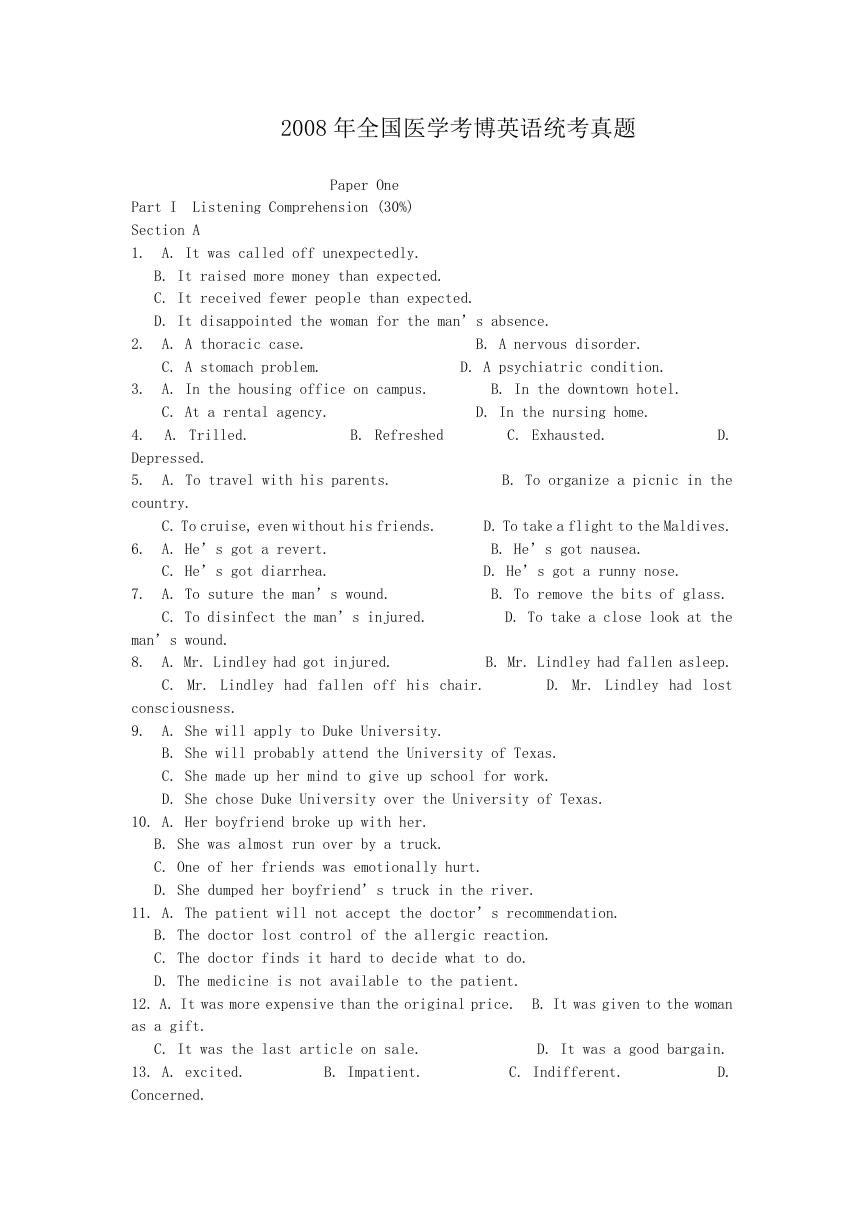
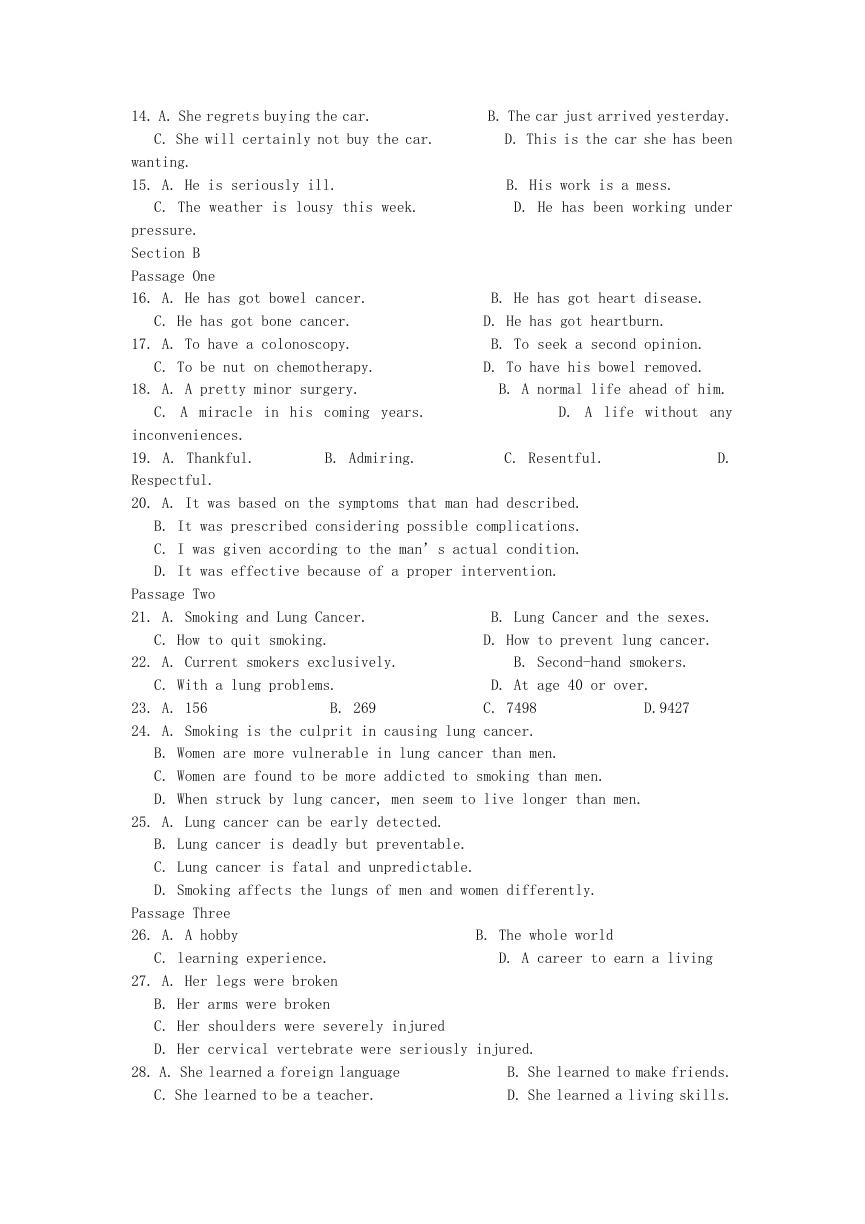
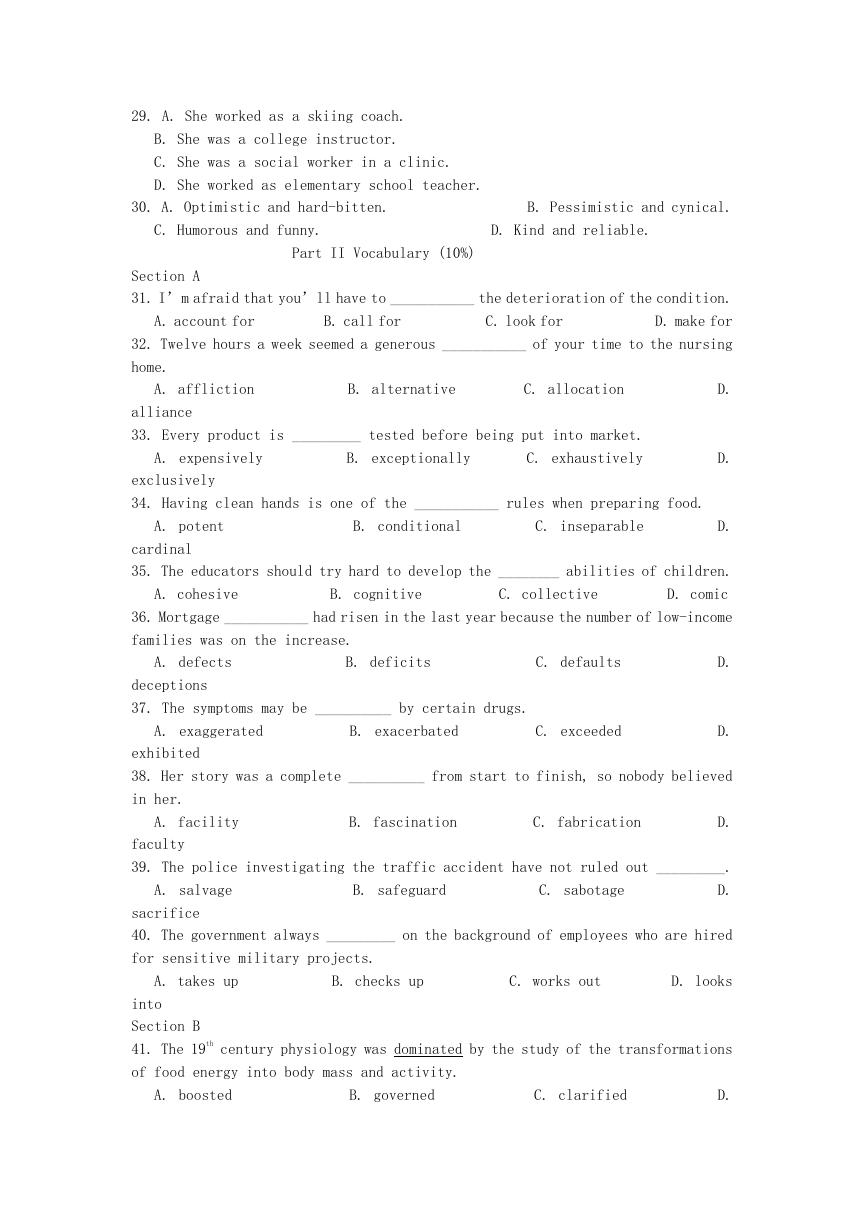
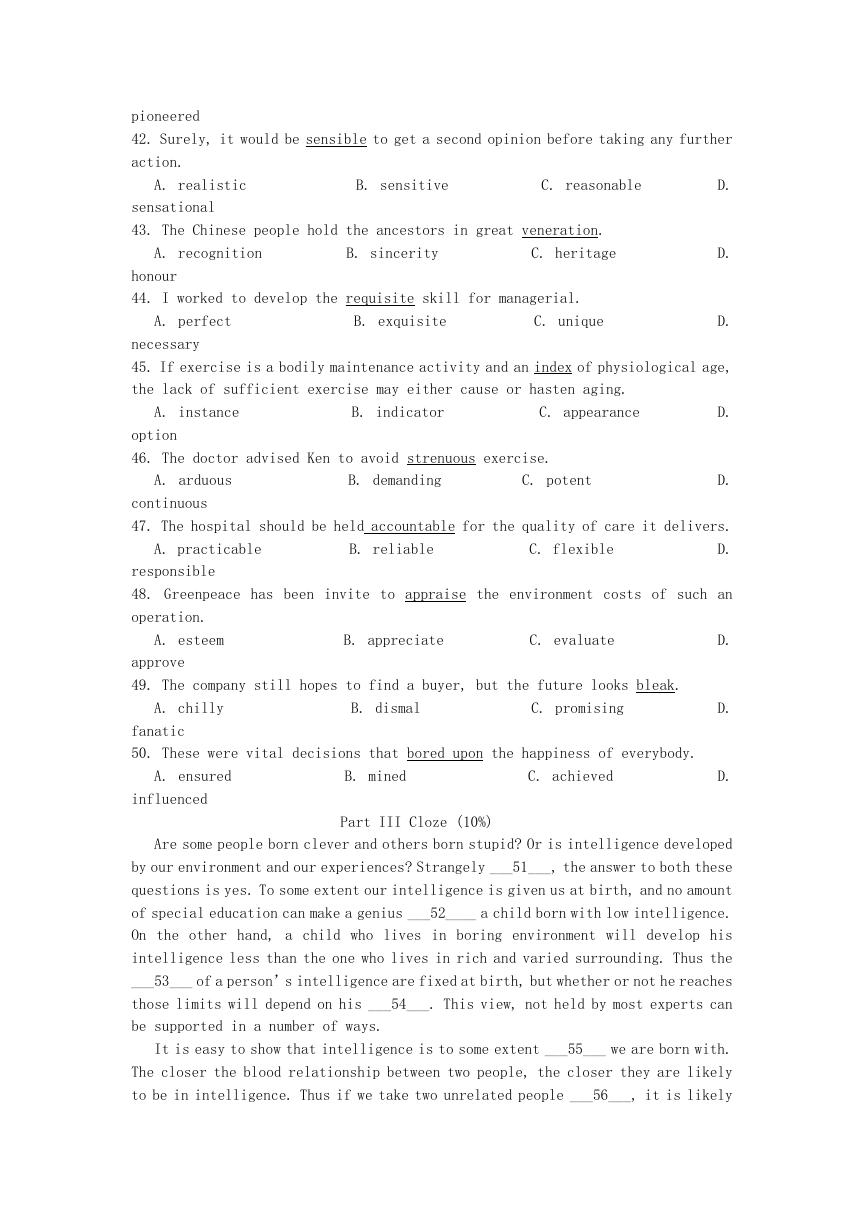
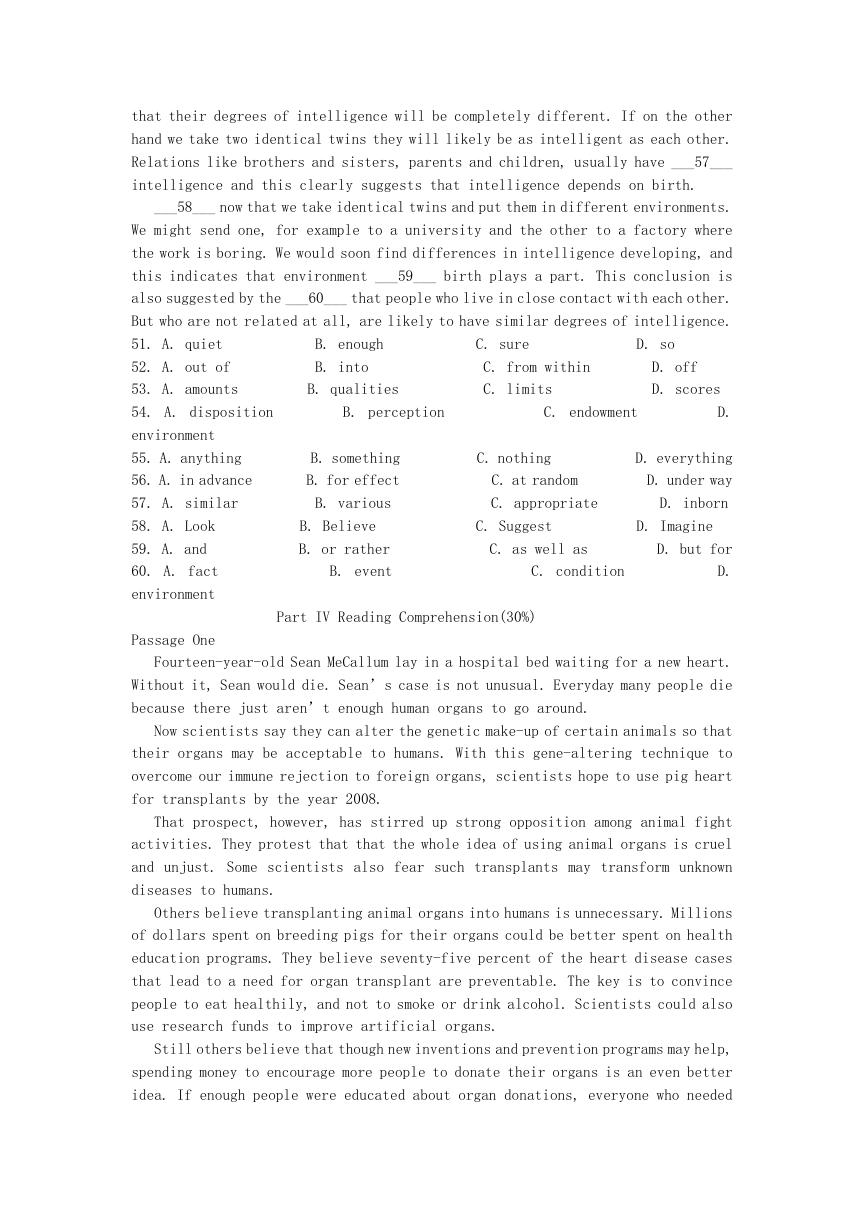
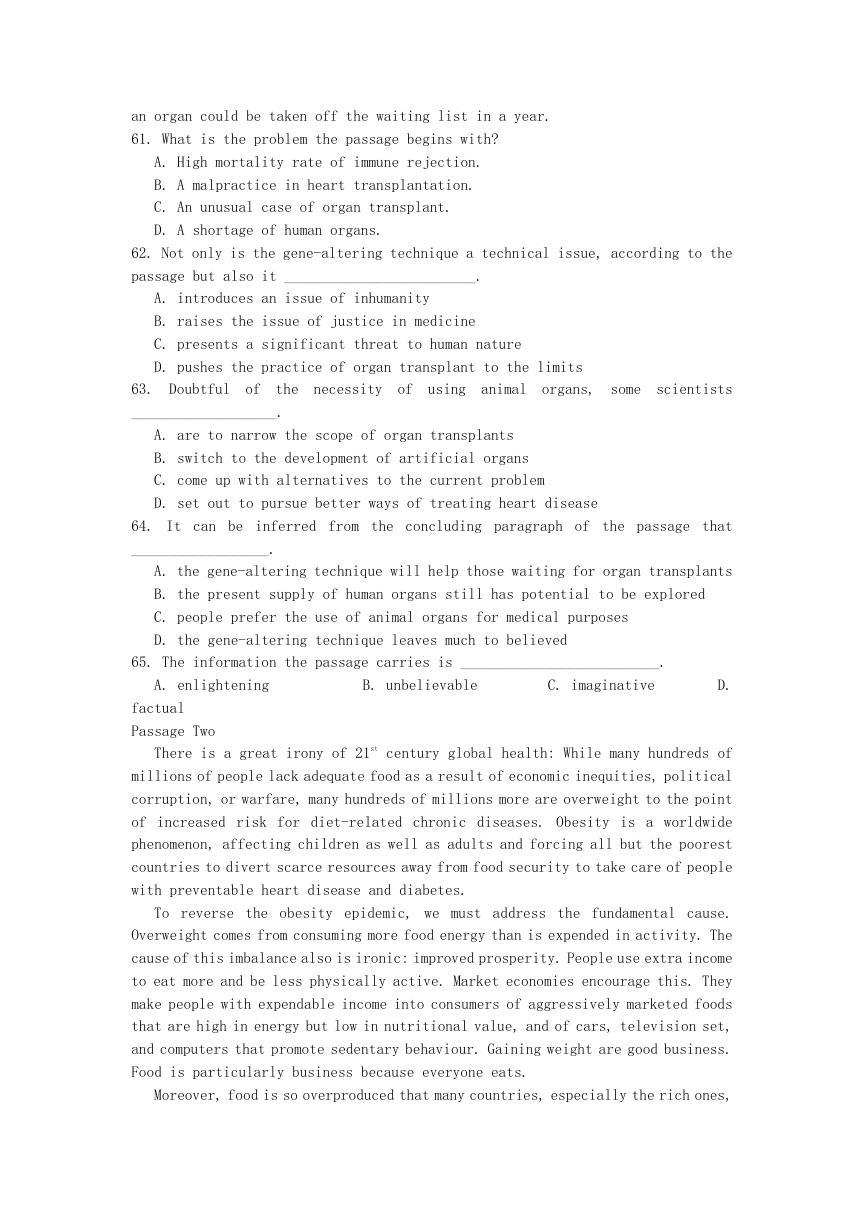










 2023年江西萍乡中考道德与法治真题及答案.doc
2023年江西萍乡中考道德与法治真题及答案.doc 2012年重庆南川中考生物真题及答案.doc
2012年重庆南川中考生物真题及答案.doc 2013年江西师范大学地理学综合及文艺理论基础考研真题.doc
2013年江西师范大学地理学综合及文艺理论基础考研真题.doc 2020年四川甘孜小升初语文真题及答案I卷.doc
2020年四川甘孜小升初语文真题及答案I卷.doc 2020年注册岩土工程师专业基础考试真题及答案.doc
2020年注册岩土工程师专业基础考试真题及答案.doc 2023-2024学年福建省厦门市九年级上学期数学月考试题及答案.doc
2023-2024学年福建省厦门市九年级上学期数学月考试题及答案.doc 2021-2022学年辽宁省沈阳市大东区九年级上学期语文期末试题及答案.doc
2021-2022学年辽宁省沈阳市大东区九年级上学期语文期末试题及答案.doc 2022-2023学年北京东城区初三第一学期物理期末试卷及答案.doc
2022-2023学年北京东城区初三第一学期物理期末试卷及答案.doc 2018上半年江西教师资格初中地理学科知识与教学能力真题及答案.doc
2018上半年江西教师资格初中地理学科知识与教学能力真题及答案.doc 2012年河北国家公务员申论考试真题及答案-省级.doc
2012年河北国家公务员申论考试真题及答案-省级.doc 2020-2021学年江苏省扬州市江都区邵樊片九年级上学期数学第一次质量检测试题及答案.doc
2020-2021学年江苏省扬州市江都区邵樊片九年级上学期数学第一次质量检测试题及答案.doc 2022下半年黑龙江教师资格证中学综合素质真题及答案.doc
2022下半年黑龙江教师资格证中学综合素质真题及答案.doc